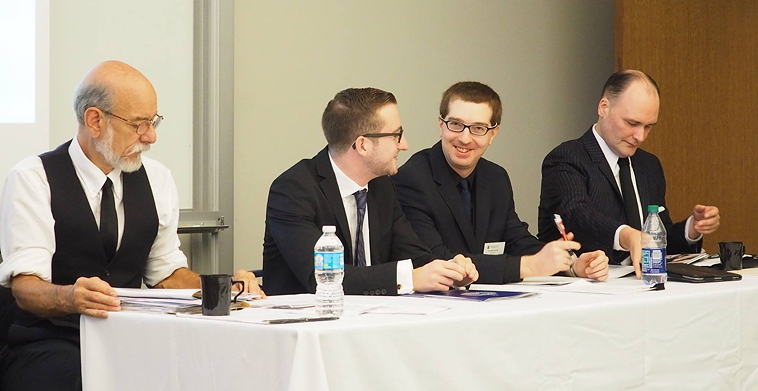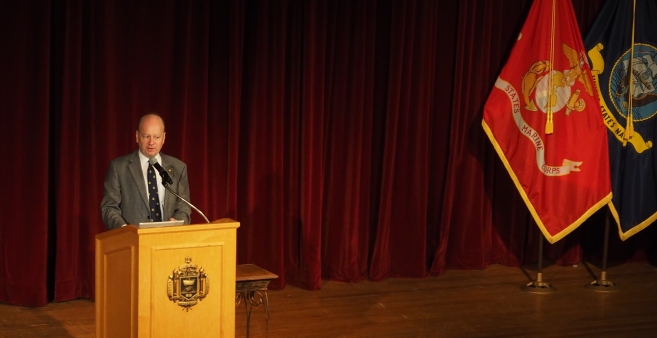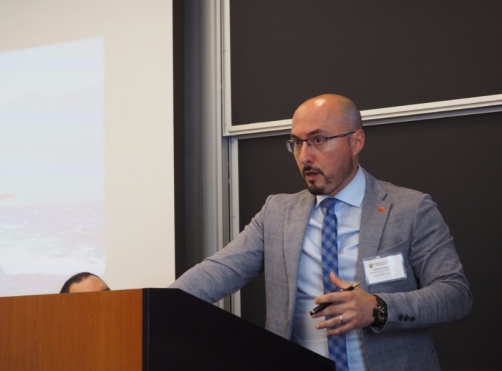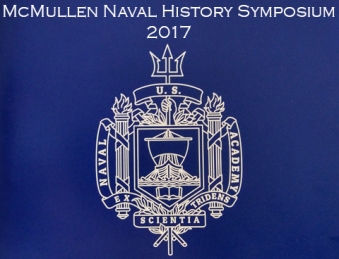
This year’s biennial McMullen Naval History Symposium, hosted by the US Naval Academy, Annapolis, Maryland, was a total success. This world-class conference featured a plethora of fascinating panels on subjects ranging from contemporary Canadian naval policy to Julius Caesar’s appreciation of naval power. As always, with a conference of this scale involving hundreds of historians and participants, any one person is only able to see a fraction of the total panels, so individual experience does matter. The conference was not generally digitized, thus, reflections from the participants provide the only method for intersubjectively preserving the experience itself, and there have already been (David Morgan-Owen) several (Trent Hone) contributions (Matthew Eng) in that regard.
The conference was organized by the vigilant Commander Benjamin “BJ” Armstrong, one of the “New Young Turks” relentlessly in pursuit of greater historical appreciation amongst the cadets and midshipmen of the growing United States Navy, not to mention a senior editor with the all-star blog, War on the Rocks. Commander Armstrong also edited the “21st Century” Mahan and Sims volumes for the US Naval Institute Press. The major themes at this years conference were the First World War (naturally enough considering the centenary), global and imperial history, seapower in the Age of Sail, the Asian and the Pacific theatres, the Second World War, naval education, and the evolution of naval technology in the 19th and 20th centuries.
Day One: September 14, 2017

From left to right: Panel Chair John Beeler, Louis Halewood, Alex Howlett, and David Kohnen (photo credit, Tim Choi)
I was a presenter on one of the first panels, along with Louis Halewood and David Kohnen. My paper on the Royal Naval Air Service and the development of anti-submarine warfare (ASW) 1917-1918, examined the impact of changing administration during wartime, and the organizational learning that took place in an unprecedented and high-technology environment. Louis Halewood described his research on the development of the Anglo-American theory of geostrategy, raising the prospect of the pre-1914 “Imperial Superstate” concept, notably diagnosed by historians such as Carroll Quigley, and Ramsay Muir. Louis Halewood introduced the influential work of luminaries such as Hartford Mackinder, Alfred Thayer Mahan, Julian Corbett, Spencer Wilkinson, and Lord Milner, theorists of naval and military power, strategy and imperial defence, who would all reappear with regularity in the politically charged panels and discussions to follow. Ultimately, the unity of the Wilsonian Anglo-American alliance broke down in the interwar period, in no small measure due to the challenge to British naval supremacy from the United States, in the process destroying the Anglo-Japanese alliance, with profound implications for Britain’s role in the Second World War.
David Kohnen discussed his research on the Knox-Pye-King report, a significant paper published in the United States Naval Institute Proceedings in 1920, bringing to the US Navy (USN) the strategic focus which had been raised in the British school, in particular, by the pre-war historians John Laughton, Julian Corbett, and Captain Herbert Richmond. Captains Ernie King, Dudley Knox and William Pye had been influenced by the irresistible force of Admiral William Sims, one of the significant contributors to the argument in favour of introducing trans-Atlantic convoys, a deciding factor in the victory over the U-boats in 1917-1918. David Kohnen argued that the modern USN had a worrying predilection for defaulting to technological dogma, with the result of the Navy utilizing the acronym saturated language of the Defense Department to stress uncritical “warfighting” instead of historical engagement and peacekeeping as the basis for doctrine.

Right to left: Panel chair Caitlin Gale, presenters Anna Brinkman, David Morgan-Owen, Paul Ramsey, and commentator Andrew Lambert (photo credit, Tim Choi)
With turn of the century grand strategy on my mind, I moved to the panel specifically examining British foreign policy, with the first paper given by Anna Brinkman (of Imperial Entanglements fame), on Britain’s strategy for managing Spain during the Seven Years War, a complex subject that relied on the interaction between significant stakeholders, Britain and Spain’s differing conceptions of the law of the sea, and the emerging balance of power in Europe. David Morgan-Owen, the brains behind the Defence-in-Depth blog, next brought the discussion into the 19th and 20th centuries by examining Britain’s evolving European and global situation, a subject that hinges on the the sticky topic of imperial and homeland defence, explored further in David’s new book. The expansion of the Committee for Imperial Defence by Prime Minister Arthur Balfour in 1904 was a watershed moment, ultimately leading to the development of conflicting army and naval strategies during the government of Herbert Asquith. Lastly, Paul Ramsey examined Spenser Wilkinson’s debate with historian Julian Corbett about the proper relation of Britain’s foreign and military policy to national strategy, a historically and politically charged sparring played out in the popular press. Professor Andrew Lambert, who was the panel commentator, observed the intricate connections between the papers, with Corbett, a scholar of the Seven Years War and Russo-Japanese War, visualizing Britain’s naval role as a component of an integrated system that only made sense once the land dynamic, with a debt to Clausewitz and Jomini, was integrated.

Chief of Naval Operations Admiral John Richardson announces the winners of the CNO’s inaugural Naval History Essay Contest (photo credit, Tim Choi)
With this auspicious start, the conference was on a sound footing. I enjoyed lunch in the beautiful Bo Coppedge Room, at the Alumni Hall, where I had an enjoyable conversation with a young officer and naval scholar on the fascinating subjects of Athens versus Sparta, US Marine Corps culture, and the recent Graham Allison book, The Thucydides Trap, concerning the possibility of American conflict with China in the 21st century. I was impressed with the student’s insight, candor, and breadth of knowledge, all of which I found refreshing (as was the key-lime cheesecake). Chief of Naval Operations Admiral John Richardson then presented the awards to the winners of the inaugural Naval History Essay Contest, which promised to raise the bar for scholarly research amongst historians and practitioners alike.
After lunch we headed to the final panel for the first day, again focused on British naval policy in the 19th century. By this point the conference was beginning to resemble a choose your own type of adventure. This was both an advantage and disadvantage of the conference’s scale and international reach. Breaking out of my own area of interest was certainly possible, with simultaneous panels taking place on American, South American, and Second World War naval history, all of which would have been fascinating to attend, if not especially related to my research focus. The conference organizers did the attendees a service by arranging the panels in such a manner that overlap was minimal and it was a fairly straightforward process to figure out which panel was the best choice for my own preferences.
This panel was chaired by John Mitcham, and the first paper was presented by John Beeler, the editor of the Navy Record Society’s Milne papers, on the subject of the Liberal party’s naval policy during the late 19th century. Beeler, who literally wrote the book on the subject, argued that the questionable choices of the Liberal party in terms of naval policy were an indication of a lack of clear strategic thinking, compared to Salisbury’s vision. The nuances of the political situation was emphasized by Peter Keeling, who followed this thread by specifically expanding on the Liberal party’s 1889 Naval Defence Act with original research that examined who voted for and against the Act, and why. Presenting the last paper of the day, Rebecca Matzke, in a fascinating paper reminiscent of the work of Michael Neiberg, discussed the efforts of British propagandists to influence American public perception of the Royal Navy’s war effort, in particular, as it related to the Royal Navy’s blockade and Germany’s counter-blockade (the unrestricted U-boat campaign). Taken together, this panel explored the interrelation of optics, how public support is galvanized by policymakers and NGOs, and the realities of budgetary and geostrategic constraints, firmly recognizing that military policy is never formed in a vacuum, and more often than not, is the result of a complex patchwork of influence.

James Goldrick delivers the 2017 McMullen Sea Power address in Mahan Hall, (photo credit, Tim Choi)
Thus we adjourned for day one. The next event was the McMullen Sea Power address to be held later that evening in the appropriately named Mahan Hall. Taking advantage of the warm evening air while moving between buildings, I stopped the always approachable James Goldrick for a brief discussion that touched on wide-ranging concepts such as Britain’s anti-submarine defence in the First World War, Germany’s strategic bombing campaigns in two world wars, and the origins of aircraft carrier strike doctrine. I was impressed as always by Professor Goldrick’s erudition. In this spirit of historical reflection, the conference participants made their way over to the fantastic US Naval Academy Museum. After touring amongst the excellent warship models and artifact displays, discussing defence policy with friends, I was stunned into a moment of clarity by news which spread like fire between the attendees that North Korea had launched yet another long-range missile, dramatically bringing home the importance of the subjects we had discussed, in otherwise academic detachment, throughout the day.
Not much more than an hour later I was sitting on the balcony of Mahan Hall watching Rear-Admiral (retired) Goldrick, Royal Australian Navy, deliver the formal 2017 Sea Power address. Professor Goldrick delivered his keynote directly to the young midshipmen sitting across from me on both wings of the balcony, and strove to reconcile the need for thorough professionalism within military education, transcending technological determinism, while also avoiding the other end of the spectrum, ivory tower detachment, a synthesis rare enough amongst long-time scholars yet also essential to the future of service culture: the next generation of young scholar-officers.
Day Two: September 15, 2017

From left to right: Trent Hone, Wes Hammond, and John Miller, USN.
With three excellent panels on Anglo-American and imperial naval history behind me, I decided to start off day two on a slightly different tact. There would be four panels to see, and I felt it was time to broaden the discussion by revisiting some areas of interest from my previous academic work. Easing into things I visited the panel highlighting some of the winners of the CNO’s essay contest, starting with Trent Hone’s analysis of operational learning by the USN at Guadalcanal in 1942. Hone argued that the Navy, with a strong foundation in historical education and doctrine, derived from the inter-war period and First World War, was well situated to adapt to operational disasters such as the Battle of Savo Island, enabling the Navy to reverse-course and ultimately out think the Imperial Japanese Navy. Lieutenant John Miller then read his case-study analysis of training failure, notably looking at the USS Stark, USS Panay, and USS Chesapeake incidents, concluding that readiness can only be achieved by a thorough understanding of not only ship and crew capability, but also, significantly, environmental awareness, the multifaceted elements of which can only be mastered through carefully cultivated experience and preparation, frequently missing in a high-tempo, rapid deployment situation. Wes Hammond then expanded on this subject by observing the importance of mobile basing, stressing the element of fleet logistics, repair and salvage, upon which all other elements are reliant. An important theme uniting these papers, explored in the panel discussion, was the recognition that contemporary naval affairs are defined by questions with historical antecedents. The notion of having, “been here before” was startling, and a clear reminder of the importance of historical investigation prior to framing naval policy.

From left to right: Dr. Nicholas Lambert, Alan Anderson, James Smith and G. H. Bennet
The fifth panel was chaired by the Naval Academy’s own Dr. Nicholas Lambert and featured papers by G. H. Bennet, Alan Anderson and James Smith. This panel took a sweeping look at the Admiralty as a political and educational organization in the 20th century. Plymouth University’s Bennet presented on the unique subject of ship and naval station libraries, a critical component in naval education that at first glance might appear parochial, yet, like many of the papers presented, once explored in detail provided rich insight. Bennet’s research explored the organic knowledge networks that developed aboard ships as crew and officers traded and circulated books, while providing a warning evidenced by the decline of these networks during the transformation of the Royal Navy as budgets tightened in the 20th century. Alan Anderson followed up by examining the seemingly bizarre decision of the Admiralty to promulgate the Declaration of London in 1909, and the implications this would have for Britain’s blockade strategy in 1914. Anderson, who has been critical of Nicholas Lambert’s work on British blockade theory, argued that in fact the Admiralty gained significant concessions from the Declaration, notably including affirmations on the illegality of shipping “absolute contraband” in times of war, while simultaneously shoring up neutral shipping rights, essential components of the Royal Navy’s historical mission as safeguard of the seas. James Smith (of the Seapower Thinker blog) built upon these papers with his criticism of the introduction of the Ministry of Defence by the Earl Mountbatten, who was Chief of the Defence staff for six years, starting in July 1959. Smith argued that Mountbatten’s personal ambitions led him to undermine Britain’s traditional maritime focus, relegating the senior service to equality with the RAF and Army, thus stripping the Navy of its institutional power, which had been carefully built up over hundreds of years.

The Battle of Virginia Capes, 1781
Controversy continued to abound in the two finals panels, both of which I attended out of interest. The first was focused on the Battle of Virginia Capes, 5 September 1781, and second on Japanese naval policy in the 20th century. This was a trip back in time for me, as I had previously written my Masters thesis on the culminating naval battle of the American Revolution, as well as my undergraduate thesis on the only decisive naval battle of the ironclad age, the Battle of Tsushima, 27 May 1905. The first of these panels was known colloquially as the Naval War College panel, featuring papers drawn entirely from that fine institution. Chaired by the College’s John Hattendorf, James Holmes presented the first paper, an insightful strategic analysis of Britain’s naval policy during the Revolutionary War. Holmes argued that Admiralty decision-making ultimately led to the abandonment of the American colonies in favour of protecting the more profitable imperial territories in the Caribbean and India, and seen from the perspective of grand strategy, was reflective of the concept of “antifragility” which helped to explain the Admiralty’s thinking. Holmes provided a broad framework that was then detailed by Jim McIntyre’s paper, examining the egodocuments of Hessian mercenary Johann Ewald, who witnessed the siege of Yorktown. The presentation of Stanley Carpenter flowed naturally from this point, providing a thorough analysis of the Royal Navy’s tactics at the Battle of the Capes itself, with particular attention to the Graves-Hood controversy that emerged. I was pleased to see, eight years after completing my thesis on the subject, Lord Hood receiving the criticism he rightly deserves for failing to bring battle decisively against the Comte de Grasse’s fleet when ordered so by Rear-Admiral Thomas Graves. The discussion after this panel was particularly insightful, with John Hattendorf moderating a lively debate about the vagaries of timing, strategic movements, and the many “mistakes” made, for example, by Lord Cornwallis, who should have known better than to allow his Carolina offensive to become locked up in a position from which the only possible escape was by sea.

Dr. Alessio Patalano presenting on Japan’s Cold War submarine policy, (photo credit: Tim Choi)
The final panel I attended was presented by Andrew Blackley, covering the lessons of the Sino-Japanese War of 1894-5, in particular the Battle of the Yalu, followed by presentations from Masashi Kurarni, Japanese Maritime Self Defense Force, looking at the Japanese contribution to the Mediterranean in 1917, and finally, by Alessio Patalano, who introduced the Self Defense Force’s submarine policy during the early Cold War. Andrew Blackley argued that Japan’s naval doctrine of rapid-fire close attack proved decisive in two major naval wars, indeed, demonstrating significant flexibility when faced with technical faults or warship losses. Flexibility was further indicated by Masashi Kurarni’s paper, showcasing Japan’s significant international alliance contribution to the anti-submarine war in 1917-1918, providing insight into the under-examined U-boat campaign in the Mediterranean. In keeping with these themes, Alessio Patalano presented the final paper, kindly aware of his duty to move quickly prior to the conference’s conclusion. Patalano observed that Japan’s strategy of core-competency paid dividends when the submarine began to take on a more significant role in Japan’s defence planning. The JMSDF was able to retain capability despite political, budgetary, and strategic transformation on an unprecedented scale.
The conference concluded back at the official symposium hotel where the 2017 Knox Awards Banquet was held, during which Dr. Edward J. Marolda, Commander Paul Stillwell and Dr. Jon T. Sumida were presented with Lifetime Achievement Awards for their stellar and dedicated contributions to naval history.
In conclusion, I was struck by the inspiring collegiality of this professional, academic conference. It serves the historians well to leave their monk-like confines to engage with the free-flow of ideas that historical symposiums inculcate. Between the brilliant and inspiring papers it was a real pleasure to be included in debate that frequently involved world-class subject experts and naval practitioners. In short, this was a transformative experience I highly recommend to anyone considering attending the next Symposium in 2019.

